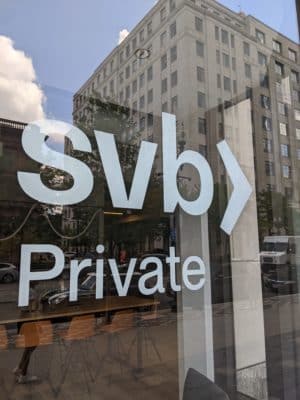
The offices of SVB Private, as Boston Private Bank & Trust was rebranded following its purchase by Silicon Valley Bank, in Boston's Back Bay. Banker & Tradesman file photo
President Joe Biden insisted Monday that the nation’s banking system was safe, seeking to project calm after the collapse of two banks stirred fears of a broader upheaval and prompted regulators to offer emergency loans to banks to stave off additional failures.
“Your deposits will be there when you need them,” Biden said.
Despite the message from the White House, investors continued to dump shares in bank stocks. Shares of First Republic Bank plunged more than 70 percent even after the bank said it was accessing emergency funding from the Federal Reserve as well as additional funds from JPMorgan Chase.
U.S. regulators closed the Silicon Valley Bank on Friday after depositors rushed to withdraw their funds all at once. It was the second largest bank failure in U.S. history, behind only the 2008 failure of Washington Mutual. New York-based Signature Bank, which maintains a presence in Connecticut. also failed.
U.S. regulators worked through the weekend to find a buyer for Silicon Valley Bank, which had more than $200 billion in assets and catered to tech startups, venture capital firms and well-paid technology workers and maintained a major presence in Boston thanks to its 2021 purchase of Boston Private Bank. While those efforts appeared to have failed, officials assured all of the bank’s customers that they would be able to access their money on Monday.
Biden: SVB Managers Should Be Fired
Speaking from the White House shortly before a trip to the West Coast, the president said he would seek to hold those responsible accountable, and he pressed for better oversight and regulation of larger banks. He promised that no losses would be borne by taxpayers.
“We must get the full accounting of what happened,” he said. “Americans can have confidence that the banking system is safe.”
Biden also said the managers of the banks should be fired.
“If the bank is taken over by the FDIC, the people running the bank should not work there anymore,” he said, referring to the Federal Deposit Insurance Corp., the agency responsible for ensuring the stability of the banking system.
International Regulators Step In
International regulators also had to step in to ease investor fears. The Bank of England and U.K. Treasury said they had facilitated the sale of a Silicon Valley Bank subsidiary in London to HSBC, Europe’s biggest bank. The deal protected 6.7 billion pounds ($8.1 billion) of deposits.
Under the plan announced by U.S. regulators, depositors at Silicon Valley Bank and Signature Bank, including those whose holdings exceed the $250,000 insurance limit, will be able to access their money on Monday. Under a new Fed program, banks can post those securities as collateral and borrow from the emergency facility.
The Treasury has set aside $25 billion to offset any losses incurred. Fed officials said, however, that they do not expect to have to use any of that money, given that the securities posted as collateral have a very low risk of default.
Though Sunday’s steps marked the most extensive government intervention in the banking system since the 2008 financial crisis, the actions were relatively limited compared with 15 years ago.
The two failed banks themselves have not been rescued, and taxpayer money has not been provided to them.
Startup Execs Feared Worst
Some prominent Silicon Valley executives feared that if Washington did not rescue their failed bank, customers would make runs on other financial institutions in the coming days. Stock prices plunged over the last few days at other banks that cater to technology companies, such as First Republic and PacWest Bank.
Among the bank’s customers are a range of companies from Massachusetts’ and California’s startup industries, a concentration that some commentators have suggested could have driven the suddenness of the bank’s collapse last week as the highly networked community moved almost as one to withdraw $42 billion in deposits March 9, according to California’s bank regulator, leaving the bank with a negative cash balance of $958 million by close of business Thursday.
Tiffany Dufu, founder and CEO of The Cru, a New York-based career coaching platform and community for women, posted a video Sunday on LinkedIn from an airport bathroom, saying the bank crisis was testing her resiliency.
Given that her money was tied up at Silicon Valley Bank, she had to pay her employees out of her personal bank account. With two teenagers to support who will be heading to college, she said she was relieved to hear that the government’s intent is to make depositors whole.
“Small businesses and early stage startups don’t have a lot of access to leverage in a situation like this, and we’re often in a very vulnerable position, particularly when we have to fight so hard to get the wires into your bank account to begin with, particularly for me, as a Black female founder,” Dufu said.
Associated Press staff writers Hope Yen, Jennifer McDermott and Danica Kirka contributed to this report.






